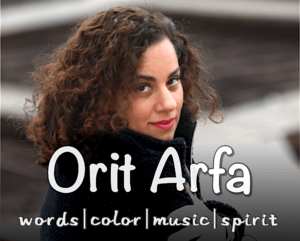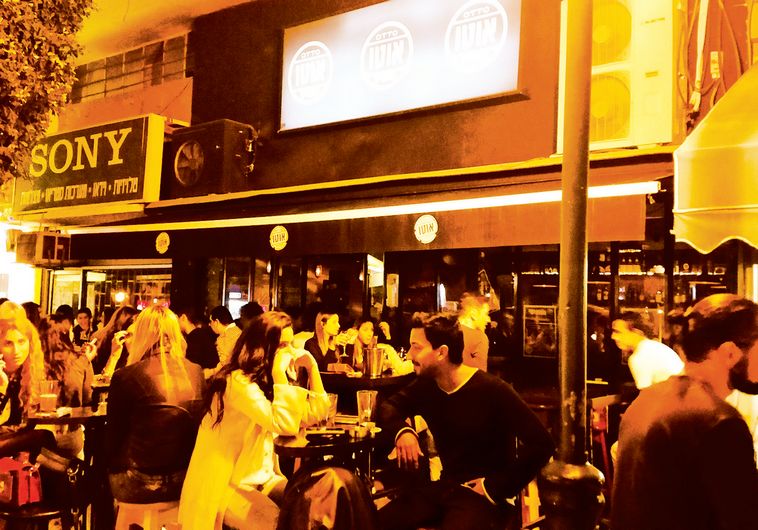Jerusalem Post, Metro Cover Story, November 13, 2014
Jerusalem Post Premium Zone subscribers can read the original here.
The popular neighborhood pub Bogart on Katzenelson, Givatayim’s main street, was built in what was once the first DVD rental place in Israel. Today, movie posters serve as decor and DVD cases as menu encasements.
This blend of the new and the old is representative of the change that this Tel Aviv suburb has undergone in the past few years: from an old-fashioned, sleepy city populated largely by pensioners and families to an attractive destination for young professionals.
Katzenelson Street (named for the socialist Zionist pioneer Berl Katzenelson) is growing into a sort of Sheinkin, the boulevard in Tel Aviv that abounds with trendy boutiques, bars and cafés (although Sheinkin’s glory days have arguably passed).
Within a one-block radius near the busy intersection of Katzenelson and Weizmann, there’s a Cofix, a felafel place and several bars that have all popped up in the last year following the migration of young professionals from Tel Aviv to Givatayim in the wake of Tel Aviv’s rising costs. Add the mall that opened in 2005, and Givatayim is emerging as a self-sustaining city, especially for 20- and 30-something-year olds.
What was still missing for the wouldbe Tel Avivians was something to do at night. Givatayim native and nightlife entrepreneur Yariv Ainmer, 39, started Bogart out of his own frustrations. Viola and Zelig, the flagship cafés in Givatayim, just didn’t cut it for the nightlife vibe.
“I’d sit in a café with a laptop in Givatayim, and I’d see young people drinking beer, so I knew something was lacking,” Ainmer says. “I used to go to Tel Aviv to drink. It cost NIS 100 for the round-trip taxi, not to mention another NIS 100 for drinks at the bar. It wasn’t right.”
Ainmer took over the storefront from his parents, who were among the pioneers of the movie rental business in Israel.
“That’s why I called it Bogart, after Humphrey Bogart. The film Casablanca was the first movie that inspired me to get into the field,” he explains.
Ainmer and his wife (who met at the bar, as did four other couples since Bogart opened three years ago) recently welcomed their first child.
He says he has noticed, particularly among his childhood friends, that the early residents of this formerly Zionist socialist stronghold are bequeathing their apartments to their offspring, giving their grandchildren the chance to live rent-free.
But Ainmer still doesn’t want Givatayim to lose its original idealist ethos. He calls Bogart a Zionist pub. During Operation Protective Edge, Ainmer collected more than NIS 30,000 from bar patrons towards the needs of IDF soldiers stationed in the South. He says he’s proud to serve Israeli beer Jems on tap, and he has plans to expand Bogart to another, as yet undisclosed, city in need of a nightlife injection.
Roy, the gregarious manager at Bogart, likes to give his boss credit for triggering Givatayim’s youth revival. He arrived in Givatayim as a bartender when Bogart first opened, thinking it would be a temporary stint.
“But I fell in love with the place. I stayed here, went from bar manager to shift manager, and now I’m the manager,” he says as Bogart’s street-lined tables start to fill up on a Monday night with a 30-something crowd of friends and couples. “Look what’s happening. You have a great vibe. A young energy. It made me stay.”
For new Givatayim resident Lavi, 28, dining with a friend at Bogart, the bars are an added benefit but not necessarily the draw. He wanted something quiet and more affordable than Tel Aviv and chose Givatayim over Ramat Gan.
“Tel Aviv is fast and always running after itself,” says Lavi. “Here, you have everything within walking distance. Good people.”
This is 32-year-old Elinor’s first time at Bogart. “I heard Katzenelson is now happening,” she says, having walked over from the Tel Aviv/Givatayim border a few blocks away.
Neighboring a busy kosher sushi restaurant, Bogart eventually couldn’t handle the surplus of customers, so Ainmer opened a sister bar across the street – Bogart Red – with a more Tel Aviv pickup orientation.
ONE YEAR ago, the Givatayim branch of the Otto bar chain became the new bar on the block, just a few storefronts down from Bogart.
“I saw the potential in Givatayim,” says co-owner Roei Harary, a Givatayim resident who also owns Otto’s Kfar Saba branch. He took over the failing Pizza Meter and gave Givatayim its first classic, gritty bar, with a focus on the liquor. “We look for sleepy cities to wake them up.”
During game season, Otto turns into a sports bar, with the cheers of fans echoing throughout the building complex.
“Givatayim was so thirsty for it. You can see it today. The bars are full every night,” he says.
And there’s still room for more. The newest addition to the emerging bar compound is Pergola, named after the bar featured in the popular Israeli crime drama Pitzuyim Berosh, starring and written by Pergola co-owner Hanan Savyon. That Savyon and his co-star, Guy Amir, chose Givatayim and not Tel Aviv solidified Givatayim’s reputation as a city that’s becoming cool.
“It’s a young, quality crowd who are Tel Aviv in their DNA – they like going out, nightlife, good food – who found themselves ‘compromising’ on Givatayim…In essence, we thought we could bring the Tel Aviv experience here,” he says.
Savyon’s TV fame drew the initial crowd, but now he finds that Pergola sustains itself very well without the celebrity cachet.
“Everyone asks us, ‘You’re famous, so why open in Givatayim and not Tel Aviv?’ We love to be the head of the fox rather than the tail of the lion. In Tel Aviv you’re one in a thousand. Here, you’re one in four,” he reasons.
Well, there are more than four bars in Givatayim now. The Django wine bar opened a block away a few months ago.
In the restaurant-bar-café genre, Anati took over from Roladin on the nearby corner, and Urban Kitchen ventured out a few blocks away on Weizmann Street.
If there’s one thing bringing these would-be competitors together, it’s the common “enemy” – disgruntled neighbors.
“We have a joint interest that the bars will unite and show the city that we can do things differently. We can live in ‘peace’ with our neighbors,” Harary says.
Pergola installed soundproof glass walls to appease the neighbors. “We fell upon them out of the sky one day,” acknowledges Nimrod Gal, one of Pergola’s four owners. “We need to learn how to strike a balance between the younger residents’ desire to go out and the needs of the more veteran residents.”
ONE SUCH disgruntled neighbor is Karin, who lives above Otto.
“We’re sick of it,” says the new mother. “I love bars. I’ve gone to bars all my life, but all the bars here – why do we need them? Not to mention the fact that the smell from the felafel stand isn’t good.”
Her neighbor Ron (not his real name, by request) agrees. “It wasn’t like this when we came,” he says.
He wishes they had opened in an industrial zone, not on a residential and commercial street where his family has lived for more than 40 years. With their condo facing the street, they have to keep the windows closed at night to keep out the noise, the cigarette smoke and the odors.
Karin resents the appearance of a bar at the entrance of her building and has difficulty pushing a stroller through the sidewalk-turned-patio. She would not have chosen this apartment – let alone refurbished it – had she known the building would become the epicenter of a bar compound.
She often calls the police to complain about the noise, and they sometimes give citations. “A ticket doesn’t make me feel better,” she says.
She wishes the bars would close but, at the very least, would like to see the outdoor patios enclosed.
In addition, she says, parking has become increasingly difficult, especially as out-of-towners patronize the bars at night.
Givatayim Mayor Ron Kunik, who was elected last October, understands the neighbors’ concerns but believes that this is the risk residents take when living on a commercial street.
“It’s hard to live on top of a bar. They truly suffer. This happens in any place that’s brimming with life. I understand it. But you can’t close the bars. You can’t prevent the city from growing. We’re doing our best to minimize the noise,” he says.
To address concerns, bars are not allowed to operate past midnight. Police presence has become more of a fixture on Katzenelson, and in the coming months Givatayim will join Tel Aviv’s Tel-O-Fun green bike rental service, with 10 bike stations installed throughout Givatayim to reduce traffic and parking problems.
Overall, the mayor believes that the majority of residents are happy with the change, and he embraces the city’s influx of young professionals.
“It’s wonderful. It breathes life into Givatayim and makes it a much more fun place to live, for the older population as well. It used to be a place where people came back just to sleep. Now you don’t need Tel Aviv to enjoy a nightlife,” he says.
The influx happened naturally without any special effort on the part of the municipality.
“We’re pretty fully booked. We have no problem attracting new people. There is a huge demand here,” says Kunik.
But Ron has watched some of his neighbors leave Katzenelson Street and points to windows above Pergola. “They really suffer.” He also points to a “For sale” sign above Bogart Red.
But for student Noa Dayan, who lives right above Pergola, the noise at night is well worth it.
“It’s like a family,” she says of her new favorite hot spot.
“And there are a lot of hot guys,” adds her friend Daniella.
The three guys sitting next to them are thrilled at the transformation.
Until the bars came along, the threesome of students who live at home, rent-free, never had anything to do at night.
“For five years we’ve dreamt of opening a bar in Givatayim,” says Dor.
And it’s a good thing the walls are soundproof. Even on a Tuesday night past midnight, a young woman in heels gets up to dance on the bar, singing along to the loud pop music.
It’s a sight not often seen even in Tel Aviv on a weekday.
Dor adds, “It’s a dream come true.”
Ron, on the other hand, is happy that winter is arriving. “We hope for rain. It will be good for us.”

